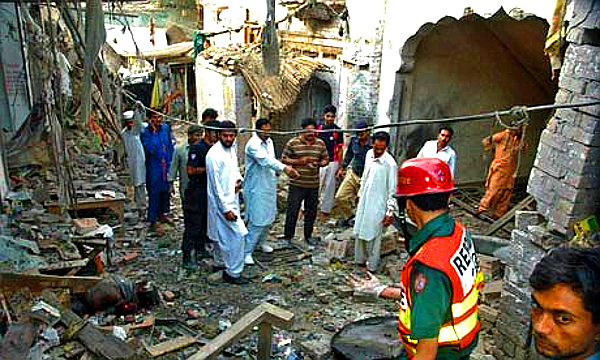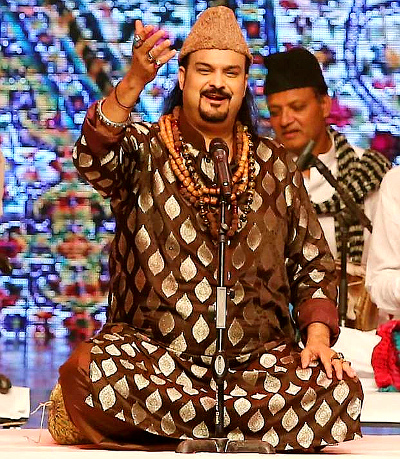“The man who spent his life singing the praises of the prophet Muhammad…was accused of blaspheming the prophet, and he was executed for it.
“During ‘Ramadan’.”
“One of Pakistan’s most famous and respected musicians, celebrated for devotional songs from a centuries-old mystic tradition, has been shot dead by ‘Taliban’ gunmen in Karachi.
“Amjad Sabri, 45, was shot by two men on a motorbike as he drove through a congested area of the port city… A relative travelling with the musician was injured but survived.
“A spokesman for the Pakistani ‘Taliban’, Qari Saifullah Mehsud, claimed responsibility for the killing and said Sabri was targeted because the group considered his music blasphemous, local media reported.
“The attack happened a day after a homeopathic doctor from the Ahmadi minority was killed in the same city, and two days after masked men seized the son of a top provincial judge, fuelling concerns about violence and extremism in Pakistan’s economic capital.
“The songs Sabri performed are part of a Sufi tradition dating back to the 13th century. Known as ‘Qawwalis’, steeped in mysticism and sometimes based on mystic poetry, they are a key part of the spiritual life of millions of Muslims across south Asia and enjoyed by wider audiences of many faiths.
“But both the music, and the shrines at which it is often performed, have long been a target for religious conservatives who shun all forms of music and consider the shrines unorthodox. Dozens of sites have been targeted in attacks, including a 2010 suicide bombing at one of Pakistan’s most popular shrines.

“The murder of a popular singer from a famous and well-loved musical dynasty was a clear warning to others…warned human rights activist Ali Dayan Hasan.
“These attacks have a chilling effect on the pluralism and diversity of religious practice and cultural expression in this part of the world. That is very worrying,” he said. “Whenever something like this happens, you are a step closer to being a Wahhabi-Salafist wasteland.”
“‘Qawwalis’ have long been criticised by the ‘Taliban’ and other hardline groups that reject all music as un-Islamic, and particularly object to those songs which focus on the life of the ‘prophet’ Muhammad.
“Sabri had been named in a blasphemy case brought by a conservative lawyer over a TV performance of one of his songs two years ago, a potentially-serious allegation because the offence can carry the death penalty in Pakistan {!}.
“The musician came from a dynasty of legendary performers, and was known for reworking classics popularised by his father and uncle. He regularly appeared on national television, and had been performing daily for ‘Ramadan’… The 45-year-old singer is survived by his wife and five children.
“Colleagues and fans denounced the ‘Taliban’ for targeting a man who devoted his life and work to religion.
“Our own dear Amjad Sabri … was a true lover of God, life and all that’s good,” said Arieb Azhar, another popular Sufi musician. “His mission of love has tragically been cut short by those who spread hate in the world, and is a great loss for all the divided people of our country,” Azhar told ‘AFP’…
“Karachi, home to 20 million people, is plagued by political, ethnic and sectarian violence… Last April, the activist and cultural leader Sabeen Mahmud was shot and killed. In May, Khurram Zaki, a rights activist and prominent critic of radical Islamists, was also gunned down in Karachi…”
–‘Amjad Sabri: Pakistani Sufi singer shot dead in Karachi’,
Emma Graham-Harrison, The Guardian (U.K.), 23 June 2016
https://www.theguardian.com/world/2016/jun/22/pakistani-sufi-singer-shot-dead-in-karachi
Main IMAGE: Rizwan Tabassum-AFP-Getty Images
WARNING – Graphic Images: https://youtu.be/-mF4IMevpLs

“Sabri, 45, was a renowned performer of ‘qawwali’ music, which comes from Sufism (Islamic mysticism) and is opposed by religious extremists. He could faithfully perform traditional songs and was also comfortable performing alongside European jazz musicians. Sabri also opened for rappers in the United States and performed popular hits in Bollywood.
“Known for his gregarious personality, he was a regular feature on television and played daily during ‘Ramadan’. He was also a passionate cricketer who was close to many of the national team’s stars and played in celebrity matches. Despite his considerable success and fame, he still lived in one of Karachi’s middle-class neighbourhoods and was known as a man of the people. It was also the area in which he died…

“‘Qawwali’ is a form of devotional music exclusive to South Asia that has its roots in 13th century Sufi Islam, yet also transcends religious boundaries. Developed from musical styles from Persia and Afghanistan, it was traditionally performed at shrines, starting in the evening and continuing through the night. The purpose was to take the listener into a state of ecstasy, through which it would be possible to grasp the true spiritual meaning…
“The ‘Taliban’ oppose all music as heresy and they consider ‘qawwali’ even worse, as it claims to be religious, and mixes profane metaphors with the ‘sacred’.
“Despite the violence, the threat qawwali faces in trying to conform to a commercialised society while retaining its spiritual roots is perhaps a more profound one. Equally, the lack of respect and interest among modern Pakistanis in encouraging their children to pursue music as an interest, is a greater worry than the militant attacks…”
–‘Why the killing of Amjad Sabri brings the survival of ‘qawwali’ culture into question’,
Ahmer Naqvi, The National (UAE), July 14, 2016

“Amjad Sabri, a master of ‘qawwali’, the devotional music that is wildly popular across the Indian subcontinent and well beyond, was gunned down in Karachi, Pakistan.
“The man who spent his life singing the praises of the prophet Muhammad, continuing a centuries-long tradition of musical veneration, was accused of blaspheming the prophet, and he was executed for it.
“During ‘Ramadan’.
“That is so important, so painful and so hard to make sense of for the many Muslims – particularly for Pakistanis like me – because ‘qawwali’ is part of our religion. At a time when Islam is reduced to warlike, uncivilized violence and portrayed as an angry, intolerant faith, ‘qawwali’ is evidence of something different…
“In South Asia, home to an astonishing one-third of the world’s Muslims, preachers and poets composed verse that survived for centuries, embedding Semitic values into local languages, a mix that was as intoxicating as it was unique. ‘Qawwali’ is the soundtrack of that tradition.
“The poetry, often Urdu or Punjabi, is set to music, usually in praise of God or the prophet Muhammad. A band of singers joins together to deliver songs that ecstatically convey the deep love of God…
“Masters of ‘qawwali’, known as “qawwals”, are world famous. In fact, ‘qawwali’ was the first concert I ever went to. His name was Nusrat Fateh Ali Khan, and only later would I know enough about who he was, and what he sang, that my mind could be fully blown…
“My parents were religious, and very much socially conservative, and taught us that we shouldn’t dance in public, and certainly never men with women.

“But when I was 11, Nusrat Fateh Ali Khan came to the University of Massachusetts at Amherst, where I was in grad school, and this very large man, cross-legged on a carpet spread out on the stage, joined by a team of musicians, began singing. Now, Nusrat was perhaps the greatest ‘qawwal’ of all time; when I was growing up, the only names mentioned alongside him were the Sabri Brothers – one of whom was the father of Amjad Sabri.
“There in that auditorium, I felt like a visitor on an alien planet, like someone who had seen the invasion of the body snatchers. My parents and their friends were up and dancing, and it wasn’t just that nobody cared; they loved it. They saw it as worship, probably…
“‘Qawwali’ emerges from the conviction that, before the majesty of God and the span of Creation, reason fails; only art, only music can possibly evoke the deepest feelings stirred in the human soul…
“Here’s Nusrat performing “Allah Hu” (https://youtu.be/kLBFmA87tyg ), a simple, stunning song…
“Here’s a Pakistani rock band, Junoon – the name means ecstasy, passion, madness – performing the same song with a modern spin (https://youtu.be/TQa5eWkpvDo ).
“In the first moments of Junoon’s performance of “Allah Hu,” singer and guitarist Salman Ahmad announces,
“The whole concept of a ‘qawwali’ is not the performer performing, but the performer and the audience being in a spiritual bond.”
“Maybe that’s why Sabri’s assassination hit so hard…
“Journalist Murtaza Hussain of the ‘Intercept’ said it hit particularly close to home.
“It was the music we grew up hearing around the house,”
Hussain recalled. Not just Sabri, he meant, but all ‘qawwali’.
“It was distinctively Pakistani and was our own unique expression of Islam. That’s why this killing really strikes at the heart and soul of Pakistan.”
“I don’t know if people outside the subcontinent can appreciate how much ‘qawwali’ music is our own expression of religion,” Hussain said…
“But I don’t think it’s a time of mourning all the same, because I don’t think Sabri himself would have wanted us to see his death that way. The Sufis call the day of your death ‘the wedding day’ — the day the lover leaves his temporary home to join his Beloved. It is a day for songs, for music, for crying out to God above and stamping your feet against the ground below, which is pretty much the best way I can think to describe our time here in this world, as long as it lasts.
“It is with great regret that I must admit that I never had the chance to see Amjad Sabri in concert, but when I think about his passing, I keep remembering that Amherst auditorium.

“Nusrat Fateh Ali Khan, a very large, very intense man, who seemed to be operating on a different plane of existence, who was among us, but not really with us. A hall where men and women, my aunties and uncles, as we addressed them, who always seemed so much older, so distant, so disconnected from the world I was born into, very soon jumped out of their seats and let loose, and turned round and round, laughing and dancing and clapping, ageless and joyous, as if they had, at last, come home…
“I hardly understood a word out of his mouth, and yet I cannot forget it.
“Which was, I suppose, the point.”
–‘For millions of Muslims, the murder of Sufi singer Amjad Sabri is about more than music’,
Haroon Moghul, Washington Post, June 24, 2016

VIDEO:
“In Pakistan, making music can have deadly consequences.
“For religious hardliners, secular music is seen as un-Islamic — and they have silenced musicians’ voices.
“Some have been killed, while others have fled the country. Those left behind face constant fear, death threats and poverty.
“It is a far cry from the golden era of the 1960s, where tunes of all genres offered Pakistanis relief from military repression and political uncertainty. But now, some younger musicians are fighting to reclaim their stage…”
‘Pakistan: Music Under Siege’,
Al Jazeera, 20 Oct., 2015
http://www.aljazeera.com/programmes/101east/2015/10/pakistan-music-siege-151020115104964.html

